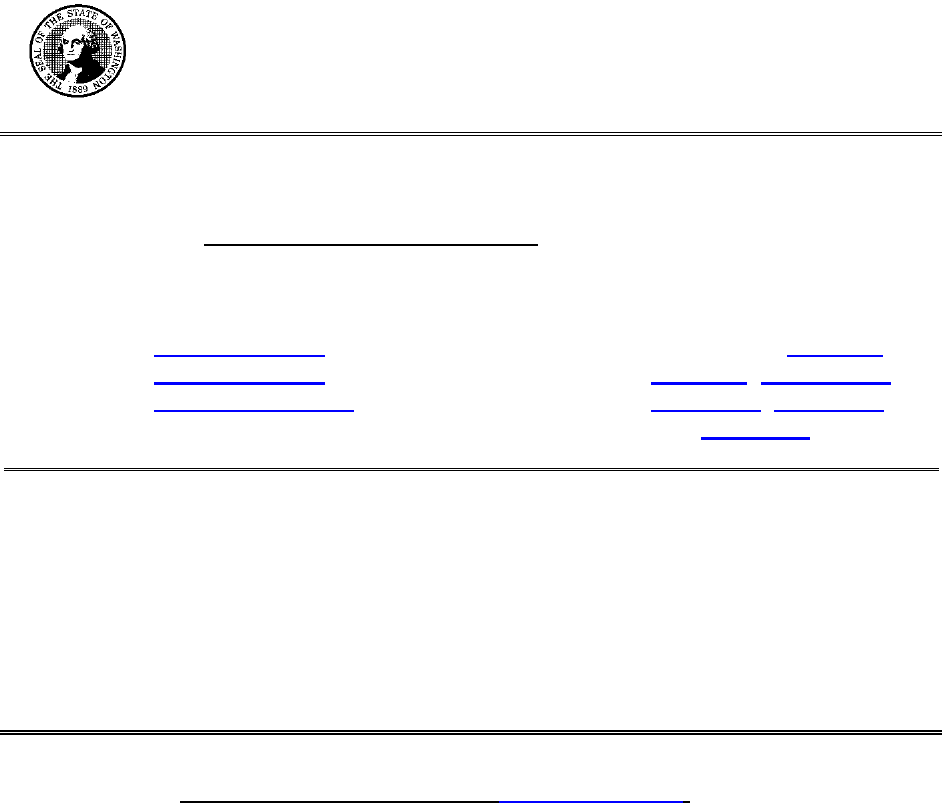
ES.A.9.6 Computer Professional Page 1 of 4 6/26/2020
ADMINISTRATIVE POLICY
STATE OF WASHINGTON
DEPARTMENT OF LABOR AND INDUSTRIES
EMPLOYMENT STANDARDS
TITLE: EXEMPTION FROM NUMBER: ES.A.9.6
MINIMUM WAGE ACT REQUIREMENTS
FOR COMPUTER PROFESSIONAL ISSUED: 6/24/2005
EMPLOYEES REVISED: 7/15/2014
REVISED: 6/26/2020
CHAPTER: RCW.49.46.010(3)(c), SEE ALSO: ES.A.8.1
RCW 49.46.130(2)(a), ES.A.8.2, ES.A.9.1 - 9,
WAC 296-128-535 ES.A.10.1, ES.A.10.2,
and ES.A.10.3
ADMINISTRATIVE POLICY DISCLAIMER
This policy is designed to provide general information in regard to the current opinions of the Department of Labor & Industries on
the subject matter covered. This policy is intended as a guide in the interpretation and application of the relevant statutes,
regulations, and policies, and may not be applicable to all situations. This policy does not replace applicable RCW or WAC
standards. If additional clarification is required, the Program Manager for Employment Standards should be consulted.
This document is effective as of the date of print and supersedes all previous interpretations and guidelines. Changes may occur
after the date of print due to subsequent legislation, administrative rule, or judicial proceedings. The user is encouraged to notify the
Program Manager to provide or receive updated information. This document will remain in effect until rescinded, modified, or
withdrawn by the Director or his or her designee.
COMPUTER PROFESSIONAL (WAC 296-128-535)
This policy provides information on the computer professional exemption from minimum wage,
overtime pay, and other employment protections under the Minimum Wage Act. Most workers in
Washington are required by law to be paid at least minimum wage, earn overtime pay, receive
paid sick leave, receive earned tips and service charges, and be protected from retaliation.
However, state regulations provide an exemption from these requirements for workers
employed as bona fide executive, administrative, professional, computer professional, and
outside sales employees. This policy describes the specific computer professional exemption
requirements. To qualify for an exemption, employees generally must meet certain tests
regarding their job duties and be paid on a salary or hourly basis at a minimum specified level.
Job titles and job descriptions do not determine exempt status. In order for an exemption to
apply, an employee’s actual job duties and salary or hourly pay level must meet all of the
requirements of the state regulations. Employees are not exempt if they perform a combination
of some duties from one exemption and some from another, but do not meet all the
qualifications for any one, specific exemption.

ES.A.9.6 Computer Professional Page 2 of 4 6/26/2020
There are also federal rules pertaining to minimum wage and overtime pay exemptions for bona
fide executive, administrative, professional, computer professional, and outside sales
employees. Employers must comply with both state and federal regulations. Where differences
exist between Washington State and federal regulations, an employer must follow the regulation
that is most favorable to the worker.
The following information provides a summary of the requirements of both state and
federal regulations for the computer professional exemption. For more specific
information on federal regulations, see CFR Title 29. Check with the U.S. Department of
Labor at their toll free # 1-866-487-9243 or on their website, or with a qualified
consultant, to determine how federal overtime requirements apply in specific
circumstances.
1. Computer Professional Job Duties Requirements.
To qualify for the computer professional exemption, all of the following tests must be
met:
1) The employee must be employed as a computer systems analyst, computer
programmer, software engineer or other similarly skilled worker in the
computer field;
2) The employee’s primary duty must consist of:
a. The application of systems analysis techniques and procedures,
including consulting with users, to determine hardware, software or
system functional specifications;
b. The design, development, documentation, analysis, creation, testing
or modification of computer systems or programs, including
prototypes, based on and related to user or system design
specifications;
c. The design documentation, testing creation or modification of
computer programs related to machine operating systems; or
d. A combination of the aforementioned duties, the performance of which
requires the same level of skill; and
3) The employee must be paid on a salary or fee basis equal to or greater than
the required salary threshold, or be compensated on an hourly basis equal to
or greater than the required hourly threshold.
2. Compensation Threshold Requirements.
To meet state exemption requirements, the employee must meet the duties test requirements
and must be paid in one of two ways: either (1) on a salary or fee basis equal to or greater than
2.5 times the state minimum wage for a 40-hour workweek (after an eight-year phase-in
concluding in 2028); or (2) on an hourly basis at a rate not less than 3.5 times the state
minimum wage (after a three year phase-in concluding in 2022). See Administrative Policy
ES.A.9.9 for more information about the salary threshold phase-in schedule and hourly
computer professional phase-in schedule. “Salary basis” is explained further in Administrative
Policy ES.A.9.1, and “fee basis” is addressed in Administrative Policy ES.A.9.8.
To meet federal requirements, the employee must meet the duties test requirements and must
be compensated either on a salary or fee basis at a rate not less than that specified in the
federal regulations, which is currently $684 per week or, if compensated on an hourly basis, at a
rate not less than $27.63 per hour.

ES.A.9.6 Computer Professional Page 3 of 4 6/26/2020
3. Differences Between State and Federal Regulations.
The computer professional exemption was created by statute in federal law as a sub-type of
exempt professionals, and the statute sets the hourly rate for the federal exemption. State law
does not separately list computer professionals in the statute, but both state and federal
regulations recognize computer professionals as a special subtype of exempt professional. The
Department intends to rely on the interpretations of the 2019 federal regulations where the
regulations are identical to the Department’s rules.
Aside from the history of the exemptions and the salary and hourly threshold differences, there
are some other areas where state and federal requirements differ. In particular, federal
regulations allow an employer to impose unpaid disciplinary suspensions of one or more full
days for workplace-conduct rule infractions for exempt workers, without affecting the exemption.
Washington State allows an unpaid disciplinary suspension of exempt employees in increments
of less than one week only for violations of safety rules of major significance. If an unpaid
disciplinary suspension is for a non-major safety violation, it may only be in a full-week
increment or it will destroy the employee’s state exemption for that period. Employers can
impose paid disciplinary suspensions in any increment without affecting the employee’s
exemption. See WAC 296-128-532 for more information about deductions for salaried, exempt
employees.
4. Computer Positions Similar to Systems Analyst, Programmer, or Software Engineer.
The computer professional exemption includes systems analysts, programmers, and software
engineers. It can also include computer professionals in other, similarly skilled positions, but
only if the primary duty of the employee in question includes performing “systems analysis
techniques and procedures, …design, development, documentation, analysis, creation, testing,
or modification of computer systems or programs, including prototypes, …modification of
computer programs related to machine operating systems;” or a combination of the duties just
described, “the performance of which requires the same level of skills.” If the required duties
tests are met, the exemption may be applied regardless of the job title given to an employee,
since an employee’s actual job duties, not job title, determine whether the exemption applies.
5. Employees Not Included in This Exemption.
The computer professional exemption does not include employees engaged in the manufacture
or repair of computer hardware and related equipment. Employees whose work is highly
dependent upon, or facilitated by, the use of computers and computer software programs (e.g.,
engineers, drafters and others skilled in computer-aided design software), but who are not
primarily engaged in computer systems analysis and programming or other similarly skilled
computer-related occupations identified in the primary duties test described above, are also not
exempt under the computer employee exemption. The exemption also does not apply to
employees in entry level positions learning to become proficient, or to employees in computer
systems analysis, programming, or software engineering who have not attained the level of skill
and expertise that allows them to generally work independently and without close supervision.
6. Certain Computer Employees May Qualify for Executive or Administrative Exemptions.
Certain employees in the computer field may also have executive or administrative duties that
qualify them for exemption under the executive or administrative exemptions. For example,
systems analysts and computer programmers whose primary duty involves work such as
planning, scheduling, and coordinating activities required to develop systems to solve complex
business, scientific, or engineering problems of the employer or the employer’s customers may

ES.A.9.6 Computer Professional Page 4 of 4 6/26/2020
meet the duties requirements for the administrative exemption. Similarly, a senior or lead
computer programmer whose primary duty is to manage the work of two or more other
programmers in a customarily recognized department or subdivision of the employer, and
whose recommendations as to the hiring, firing, advancement, promotion, or other change of
status of the other programmers are given particular weight, may meet the duties requirements
for the executive exemption. However, an employee must meet all of the requirements of the
particular exemption to qualify. Employees are not exempt if they perform a combination of
some duties from one exemption and some from another, but do not meet all the qualifications
for any one, specific exemption. See ES.A.9.3 and ES.A.9.4 for more information on the
“executive” and “administrative” exemptions.
7. Trainees Are Not Computer Professionals.
The exemption does not include employees training to become computer professionals
and not actually performing the duties of an exempt computer professional. However, a
bona fide computer professional employee does not lose the employee’s exempt status
merely by undergoing further training for the job performed.
